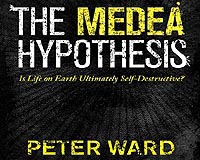| . |  |
. |
Washington DC (SPX) Jun 09, 2009 Studies of climate evolution and the ecology of past-times are often hampered by lost information - lost variables needed to complete the picture have been long thought untraceable but scientists have created a formula which will fill in the gaps of our knowledge and will help predict the future. A novel method of reconstructing missing data will shed new light on how and why our climate moved us on from ice ages to warmer periods as researchers will be able to calculate lost information and put together a more complete picture. Similarly they will be able to tackle ecological studies that are currently incomplete or distorted. Why do populations of animals like rabbits and foxes fluctuate so dramatically? Which factors most heavily influence population decline and, eventually, lead to extinction? Published in the June issue of New Journal of Physics (co-owned by the Institute of Physics and German Physical Society) the paper 'Recovering "lost" information in the presence of noise: Application to rodent-predator dynamics' offers a solution to the problem of reconstructing missing or lost information in studies of dynamical systems such as the Earth's climate or animal populations. It could potentially uncover new findings on topical scientific issues such as climate change and the extreme population fluctuations in some animal species. By developing a novel Hamiltonian approach to the problem, using a mathematical algorithm, assuming the dynamics of each system has unknown parameters and that the data are distorted by random fluctuations, the researchers from California and Lancaster were able to successfully recreate measurements in a study on a vole-mustelid community. Many small mammalian species have cyclic population dynamics, periodically oscillating between large and small communities, a behavioral phenomenon which has puzzled ecologists for decades. Reconstructed data on such predator-prey dynamics could now give new insight into why some species suddenly decline. Climate evolution is subject to similar cyclical variations, which could be uncovered by applying the method to measuring the distribution of isotopes in sediments taken from the ocean floor, potentially giving further insight into the reasons behind climate change. As the researchers write, "The method will also be applicable quite generally to cases where some state variables could not be recorded." These could include, not only climate change and ecology, but also contexts such as populations at risk from epidemics and rocket motors for new space crew exploration vehicles. Share This Article With Planet Earth
Related Links Institute of Physics Dirt, rocks and all the stuff we stand on firmly
 Earth Perhaps Not Such A Benevolent Mother After All
Earth Perhaps Not Such A Benevolent Mother After AllSeattle WA (SPX) May 27, 2009 In the past 50 years it has become commonplace to think of Earth as a nurturing place, straining mightily to maintain equilibrium so that life might continue and flourish. The Gaia hypothesis, named for the ancient Greek goddess of Earth, even put forth the idea that our planet behaves as a kind of giant organism, with its complex systems finely tuned to compensate when one system gets out ... read more |
|
| The content herein, unless otherwise known to be public domain, are Copyright 1995-2009 - SpaceDaily. AFP and UPI Wire Stories are copyright Agence France-Presse and United Press International. ESA Portal Reports are copyright European Space Agency. All NASA sourced material is public domain. Additional copyrights may apply in whole or part to other bona fide parties. Advertising does not imply endorsement,agreement or approval of any opinions, statements or information provided by SpaceDaily on any Web page published or hosted by SpaceDaily. Privacy Statement |